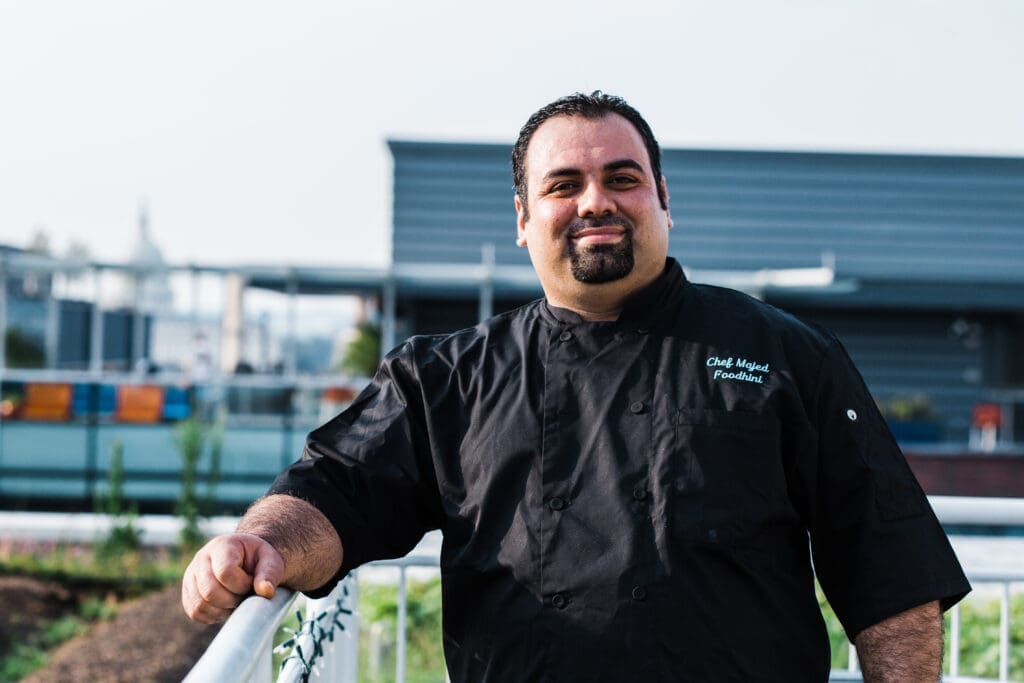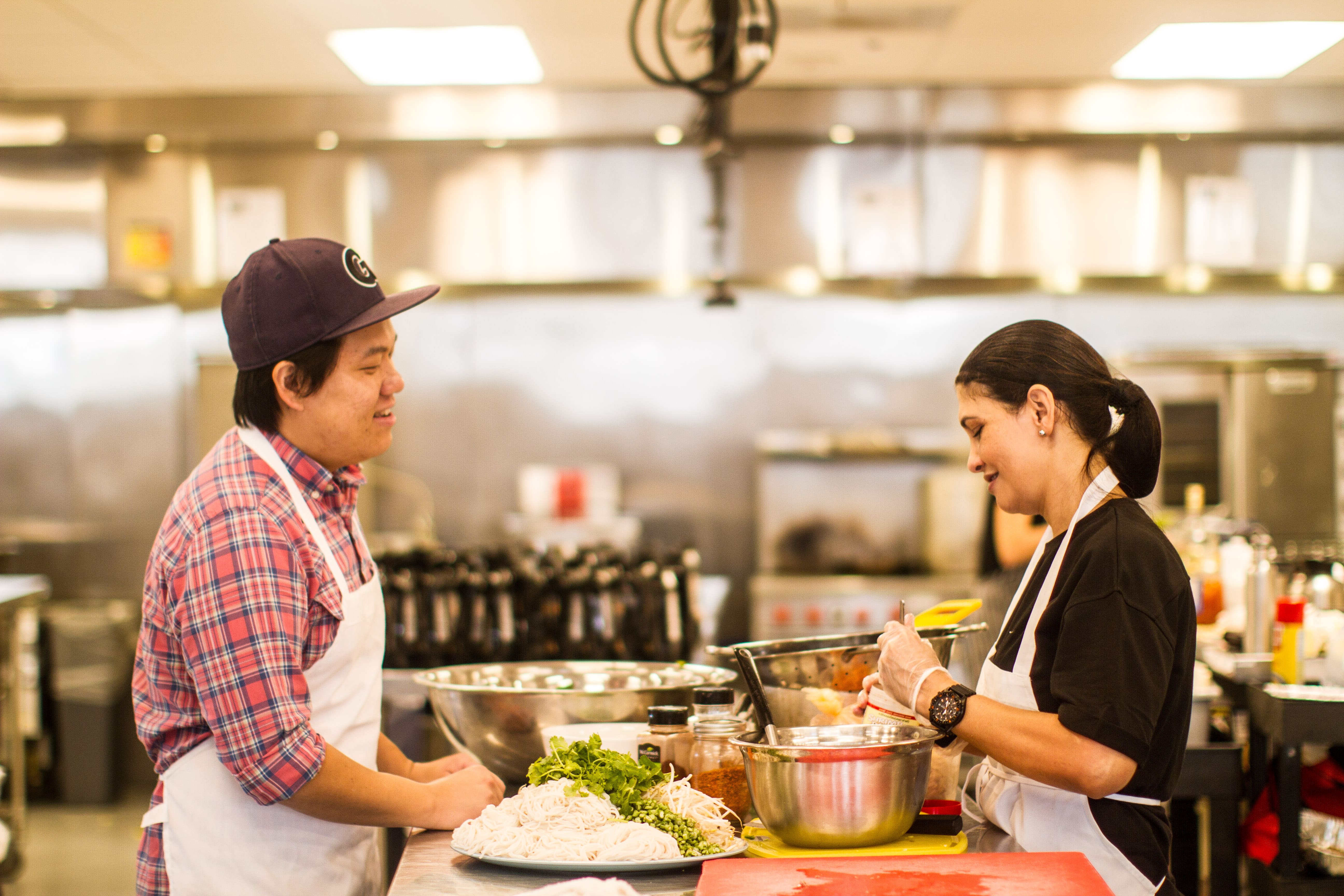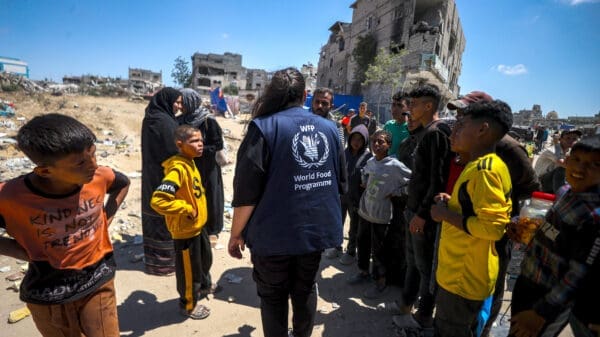Shawarmas From Syria: One Refugee Chef’s Story

Chef Majed Abdulraheem is a Syrian refugee who fled his home because of the war and violence on his streets. After moving to the United States, he met Noobtsaa, the son of Laotian refugees who understands the challenges of leaving all you know behind.
On National Entrepreneur’s Day, we’re revisiting the inspiring stories of these two chefs who have shown by example the immense value immigrants and refugees bring to their new homes.
In 2009, Chef Majed Abdulraheem lived in Syria, and life was good. He had just finished culinary school and was working at a restaurant in Damascus. On weekends, he’d visit his parents in his nearby hometown. The streets were always safe, and everyone had enough. But then everything changed.
In 2011, war began, and safety diminished. For Majed, a simple weekend trip to his parents became a life-threatening journey as soldiers and checkpoints lined the route. Walking down the streets of Damascus was no better. One day after work, he returned to see his entire neighborhood gone – demolished by government bombs.
Fearing for his life, Majed’s parents asked him to leave Syria in 2013. By then, violence was everywhere. War had made jobs scarce and food unaffordable. People were hungry and struggling just to survive. So, Majed agreed to leave. He packed what he could and fled to Jordan.
Safety and Struggle
The journey was treacherous, but Majed made it safely to Jordan, where he stayed at Za’atari refugee camp before heading to Amman, Jordan’s capital city.
“In Jordan,” Majed said, “I was safe, but that was the only thing that was better. Life was hard, too hard there.”
As a refugee, Majed wasn’t allowed to work. He struggled to make ends meet. He did receive help from WFP in the form of a food voucher, which he used to buy some of the food he needed to survive. He always had just enough – which made Majed one of the lucky ones. Too many Syrian refugees in Jordan, he said, simply went hungry.
“I was in Jordan for three years,” Majed continued, “but it felt like 300, because life was a struggle.”
There were some happy times for Majed in Jordan. He got married and had two little girls. But having a family to support made Majed even more desperate to work. So, when the opportunity to move to America came up, he seized it. Majed and his family moved first to Arizona and then to Maryland, where he sought culinary work. He was soon introduced to Noobtsaa Vang, who was seeking immigrant and refugee chefs to work for his company, Foodhini.
Braving Hardships and Feeding Dreams
As a child of refugees, Noobtsaa understands the challenges they face. His family is Hmong and came to the U.S. from Laos in the late 1970s. They braved tremendous hardship and danger in their journey, but – with the help of international aid organizations – made it to Minnesota to start a new life.
America provided safety for Noobtsaa’s family, but also a different set of challenges. With limited English and lack of American education, his father’s work opportunities were few. He worked multiple factory jobs to support his family, sometimes sleeping in his car between shifts. Noobtsaa’s family had to adjust to an unfamiliar culture in an unfamiliar land, but through it all, one aspect of life remained unchanged: their family meals. His mother cooked extraordinary Hmong cuisine, and passed her love of it onto her American children.

Noobtsaa (left) in the kitchen with a Foodhini chef.
When Noobtsaa moved to Washington, DC for graduate school, he realized he couldn’t find any Hmong cooking in the city. And that’s when his idea for Foodhini was born. Noobtsaa wanted to create a company that helped refugee and immigrant chefs find good work, and also enabled others to experience their homecooked cultural cuisines.
That was four years ago, and now Noobtsaa’s dream is a reality. Foodhini is an online restaurant and catering company that features chefs from across the world, including Chef Majed.
Sharing Meals and Opportunity
Majed has been working with Foodhini for about four years now and has been in America for five. His food is a hit; his specialty is Syrian shawarmas. He loves sharing the food he was raised on with people in the U.S.
“Many of the meals on my menu were cooked by my mother,” Majed said. “I am a good cook, but I cannot cook better than my mother!”
Through Chef Majed’s work with Foodhini, he has helped the company grow. And Noobtsaa’s goal is for that growth to continue. Right now, the company only serves Washington, DC, Arlington, VA and Takoma Park, MD, but he hopes to expand it across the country.
“I want to bring to light the amazing diversity that is in all our cities, help immigrants and refugees, and enable people across the U.S. to experience incredible, multicultural cuisine.” Noobtsaa says.
Of course, without the talent and hard work of its chefs, Foodhini would go nowhere. Together, Noobtsaa and the chefs he employs have created a thriving business. Chef Majed is passionate about sharing this, and helping people understand the incredible value immigrants and refugees bring.
“One thing I really want people to know,” said Majed, “is that refugees will not take from your country, they will add. In Syria, we are doctors, computer programmers, handymen, chefs. We have skills and experience from our home countries that we can bring and contribute to America.”
“I like America, because if you have a dream, you can go after it,” Majed continued. “And I hope people can understand that refugees, we have dreams and we will work hard. We are not a problem for this country, we can help it. This, I know.”




